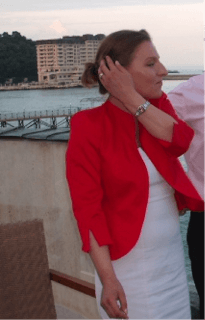December 16, 2013
FACES OF FREEBSD
Each week we are sharing a story from someone involved in FreeBSD. This is our Faces of FreeBSD series. It may be a story from someone who’s received funding from us to work on development projects, run conferences, travel to conferences, or advocate for FreeBSD. Or, it may be from someone who gives back to FreeBSD financially or in another way. But, it is always from someone who is making a positive difference in the FreeBSD world.
Here’s a chance to get to know your fellow FreeBSD enthusiast. Sit back and enjoy another 2013 Faces of FreeBSD story.

My name is Shteryana Shopova. I am 31 years old and live in Sofia, the capital of a small East European country called Bulgaria. I have a Bachelor’s degree in Computer Science from the University of Sofia and am finishing a Master’s degree in Computer and Network Security there. I was a guest lecturer at the Network Security course at my Alma Mater this semester, which, along with organizing EuroBSDCon 2014, is one of the biggest challenges I am facing in the next several months.
Away from computers, I enjoy the company of my family and friends, a glass of good wine, and outdoor sports. I was on my school’s female basketball team for a few years, and I still enjoy playing the game (I’m good at it). I learned to ski as a kid and I’m happy to be back on the ski slopes in Europe after suffering a serious ankle injury a couple of years ago. I am praying for lots of snow this winter.
My first exposure to FreeBSD was in 2004 when I was working for a company producing network devices. The OS that we developed and ran on the devices was based on WindRiver’s vxWorks, with a TCP/IP stack derived from the very early ones from FreeBSD/NetBSD. I often found myself looking at the projects’ CVS repositories for solutions of problems that I encountered at work. In 2005, I did the Google Summer of Code program for FreeBSD, coding the client side of the SNMP protocol. Since all FreeBSD development has to happen on FreeBSD-current, I installed FreeBSD on my laptop—alongside the Windows and Slackware Linux I was running on it at the time. Several months later I realized that apart from FreeBSD, I hadn’t booted the other two operating systems in months. So I wiped them out.
I try to help the FreeBSD Project any way I can. I am maintaining the native SNMP daemon and client code, doing bugfixes in networking related parts, testing the OS a lot by following the HEAD (a.k.a FreeBSD-CURRENT), and trying out new stuff that gets added there. The last couple of years I had to put off most of the technical work I do for FreeBSD in favor of finishing my formal education. Nevertheless, I continue to help by advocating for FreeBSD. I’ve given
FreeBSD-related talks on several occasions, organized a BSD-dedicated track at OpenFest (the largest local OpenSource conference), and proctored BSDCG certification exams (the equivalent of LPIs for BSD system administrators). I am also on the board of the EuroBSDCon Foundation in the role of the EuroBSDCon 2014 Organizing Committee Chair.
Why FreeBSD? I think it’s the only OS that so nicely fits all my needs. I appreciate the modern and easy-to-administer filesystem—ZFS, plenty of virtualization options including bhyve, the fast and modern networking stack, plenty of third party software via the ports and packages, and more. I value the extensive and good documentation, and the high quality and liberally licensed source code (so I can experiment, make modifications, or fix problems myself without having to wait for upstream patches, or even sell it without any legal concerns). Finally, by interacting with the FreeBSD community and developers—the entire BSD community in fact—I’ve learned so much and continue to learn. I think it has shaped me as the professional I am today, and I am very thankful for that.
I think the FreeBSD Foundation is doing a great job of supporting the project. As a developer, the most important activities of the Foundation are funding developers to work on various projects, sponsoring FreeBSD-related technical events, and giving travel grants to developers so that we have a chance to meet physically and discuss ideas, projects, and problems. A couple of years ago I added SNMPv3 authentication, encryption, and access control to bsnmpd(1), along with a module for monitoring wireless interfaces. People had asked for those additions for some time; I doubt I would have had the time and resources to implement them if the Foundation hadn’t sponsored me.
I want to appeal to everyone: if you like FreeBSD, please consider a donation to the FreeBSD Foundation, so we can make FreeBSD even better. And I hope to see you at EuroBSDCon next year in Sofia!
Shteryana Shopova
Donate today to help us continue and increase our support of the FreeBSD Project and community worldwide! Making a donation is quick and easy. To make a donation go to: http://freebsdfoundation.org/donate/
